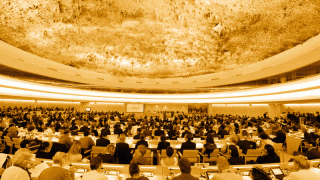
SUPPORT FOR SUSTAINABLE DEVELOPMENT - GREEN
The UK is a generous aid donor. It must ensure funds go where they are most needed – including underfunded UN human rights and humanitarian programmes.
This scorecard assesses the UK's performance on key areas using impartial sources. Applying our methodology, we scored the UK green as its actions are helping to strengthen the rules-based international system.
Our rationale
The UN has saluted the UK’s leadership on international development, which supports global and British interests. UNA-UK believes there is a real opportunity – and need – to direct aid towards UN programmes that are struggling in light of increasing demands and budget cuts. The UK must also address longstanding concerns about how aid is used. The International Development Committee recently warned that using aid to win trading concessions could lead to “insufficient focus on poverty reduction”.
Our analysis
The UK is the only G7 country to meet the UN target of spending 0.7% of Gross National Income on overseas aid. UNA-UK welcomes cross-party consensus on this issue and the 2015 legislation enshrining the 0.7% target into national law.
Despite criticism by some MPs and large swathes of the UK media, the UK has consistently met this target since 2013 and gained respect for its handling of the aid budget, leading the President of the World Bank in 2015 to describe the UK as “courageous” noting that ‘there is no bilateral organisation in the world that does it better than DFID’.
UK public attitudes towards the UK’s aid spend are less generous. BOND’s Aid Attitude Tracker shows that over half of the UK public believe that aid is wasted and that the budget should be cut – although most people believe the UK spends much more than it actually does. The Government must articulate how aid spending is in the UK national interest while remaining focused on helping those most in need.
The Sustainable Development Goals offer a framework for doing so, as a universal agenda that seeks to improve the lives and livelihoods of people in all countries. The UK has a real opportunity to lead by example, by supporting the Goals through its aid programmes and by striving to implement them at home.
Anchoring aid policy in the Goals will help to assuage concerns, recently articulated by the International Development Select Committee, that poverty reduction – as opposed to trade and military objectives – must always remain the “primary purpose” of spending.
There is also a real opportunity – and need – for UK to support multilateral organisations, which are cost-effective and impact-enhancing channels for UK aid, particularly UN programmes aimed at preventing crises, such as human rights initiatives, as well as those responding to them. This is especially the case at a time when the UN is overstretched and facing serious funding shortfalls, including as a result of budget cuts to crucial programmes like UNRWA.
Read UNA-UK’s publication on the Sustainable Development Goals
Photo: FAO/Matthias Mugisha/Uganda - Kapchorwa district





